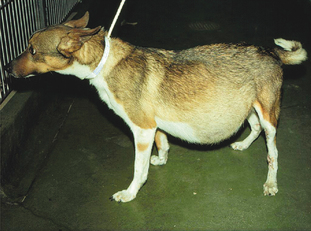Chapter 1 The History and Physical Examination
MEDICAL HISTORY
Signalment
Sex
Males are more susceptible to certain cardiac diseases (e.g., male cocker spaniels to endocardiosis of the mitral valve, and large-breed males to dilated cardiomyopathy). However, sick sinus syndrome occurs in the female miniature schnauzer and PDA is more common in females than in males.
History
SPECIFIC SYMPTOMS
Coughing
Table 1-1 Characteristics of Coughs and Their Associated Causes in Dogs and Cats
| Type of Cough | Causes |
|---|---|
| Acute cough | Tonsillitis, pharyngitis, tracheobronchitis, acutebronchitis, pleuritis, acute left heart failure (dogs) |
| Chronic cough | Right or left heart disease, heartworms, enlarged left atrium compressing the left mainstem bronchus (dog only), pulmonary neoplasia, asthma (cat only), chronic respiratory problem, chronic bronchitis (dog only) |
| Acute onset, soft that rapidly becomes worse in dogs with dyspnea | Pulmonary edema |
| Mild, intermittent cough, harsh, low pitched in dogs | Chronic heart disease |
| Loud, harsh, dry, sudden onset followed by gag in dogs | Tracheobronchitis |
| Honking, high-pitched in dogs | Collapsing trachea or bronchi |
| Chronic, paroxysmal, loud, honking with excitement in dogs | Large airway disease |
| Cough after drinking in dogs | Cardiac disease, collapsing trachea, chronic tracheitis, tracheobronchitis, laryngeal paralysis, dysphagia |
| Cough after eating in dogs | Pharyngeal dysfunction, megaesophagus, vascular ring anomalies, esophageal diverticula, esophageal foreign bodies, esophageal tumors |
| Cough without an inciting factor | Cardiac, pulmonary, or extrapulmonary disease |
Dyspnea
Key Point
Dyspnea is a sign of significant cardiac, respiratory, or other systemic problems. It requires immediate diagnostic tests to identify the cause of the dyspnea so that specific therapy can be started. However, all tests should be done with minimal stress to the animal as these patients are very fragile and could die with stress.
Table 1-2 Types of Dyspnea and Their Associated Diseases or Problems
| Type of Dyspnea | Disease or Problem |
|---|---|
| Acute dyspnea | Pulmonary edema (cardiogenic and noncardiogenic), severe pneumonia, airway obstruction, pneumothorax, pulmonary embolism |
| Chronic, progressive dyspnea | Right heart failure with ascites and/or pleural effusion, pericardial diseases, bronchial disease, lung diseases (e.g., emphysema), pleural effusions, progressive anemia, primary and secondary neoplasia |
| Dyspnea at rest | Pneumothorax, pulmonary embolism, severe left or right heart failure |
| Exertional dyspnea | Heart disease (e.g., dilated cardiomyopathy) or chronic obstructive lung disease |
| Expiratory dyspnea | Lower respiratory tract obstruction or disease |
| Inspiratory dyspnea | Upper airway obstruction |
| Mixed dyspnea | Pulmonary edema due to left heart failure or severe pneumonia |
| Orthopnea | Severe pulmonary edema, pericardial effusion, pleural effusion, diaphragmatic hernia, pneumothorax, severe pulmonary disease |
| Paroxysmal dyspnea | Arrhythmias (e.g., bradycardia or tachycardia) |
| Simple dyspnea | Fever, fear, pain, or excitement |




